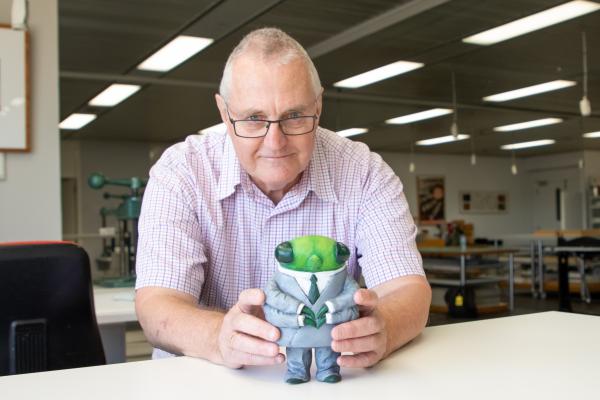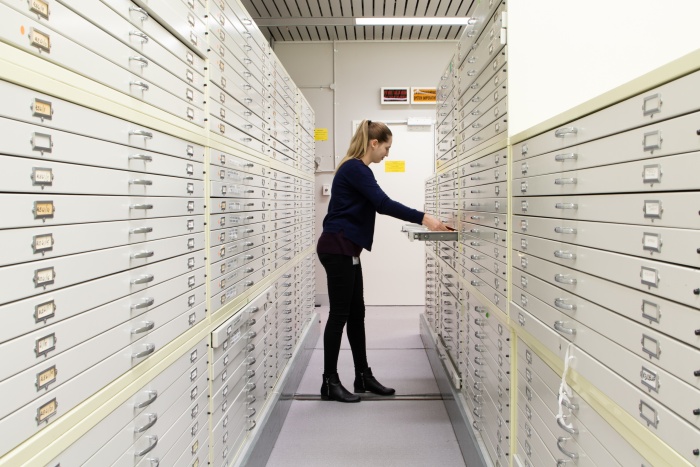Do you have historical or contemporary material related to Western Australia you believe has important research value, significance or rarity? The State Library welcomes offers from individuals and organisations that enrich the collection. Please read the information on this page carefully before making an offer.
The State Library collects published and unpublished (original) materials that are:
- Created in Western Australia
- About Western Australia, or
- Created by a Western Australian, or someone with a significant connection to Western Australia
The material we collect reflects the social, political, economic and cultural history of Western Australia.
Find out more about donating to our collections
What we accept
The State Library collects published and unpublished (original) materials that are:
- Created in Western Australia
- About Western Australia, or
- Created by a Western Australian, or someone with a significant connection to Western Australia
The material we collect reflects the social, political, economic and cultural history of Western Australia.
All offers received will be assessed in accordance with the State Library’s Collection Strategy. We may also consider the material’s research value, significance, rarity, our existing holdings and the potential preservation and storage costs.
Some of the specific types of material we collect are outlined below.
Archival materials
We collect archival material that relates to individuals and families, as well as organisations, clubs, associations, and businesses. This could include:
- Correspondence (letters, telegrams, emails etc.)
- Diaries/Journals
- Manuscripts
- Notebooks (e.g. field books, jottings)
- Postcards
- Drawings (sketches, cartoons etc.)
- Invitations
- Legal papers
- Awards (including degrees, certificates etc.)
- Plans and maps
- Career documentation (including curriculum vitae, résumés etc.)
- Scrapbooks
- Contracts
- Reports
Photographs
We collect both contemporary and historical images, such as photographic prints and negatives or slides. One off donations of individual images as well as large collections of photographs may be accepted.
Images are selected to provide an understanding of, and support research into, the people, place, customs and traditions of WA. We will consider offers on a wide range of topics, but are particularly interested in images that reflect:
- Daily life in rural areas and regional viewpoints
- Cultural diversity
- Social change
- Protests and demonstrations
- Current events
If you are seeking remuneration, please contact the Collection Liaison team at the Library. Material will only be purchased if it is a fair and reasonable market value and it meets our selection criteria.
Film
We collect moving pictorial images in any format that reflects life in WA including historical events, places, industry, social and cultural life and people. We collect key productions from the WA film industry, and also private sector productions and amateur and home movie footage if they have significant Western Australian information content.
Further information for photographers and filmmakers.
Oral histories
Oral histories are structured interviews in which interviewees talk about their lives, particular events, or experiences in the past. Our collection consists of sound recordings in both digital and analogue formats, and may include accompanying transcripts and images. When collecting oral histories, we seek stories of everyday Western Australians, as well as prominent individuals, representing a wide range of social backgrounds, employment groups, ethnic communities, lifestyles and experiences.
Ephemera
We collect a representative sample of ephemeral items, which are the transient documents of everyday life in Western Australia such as pamphlets, leaflets, flyers, tickets and posters. These materials can often be discarded, but provide valuable insights into our way of life, and help to tell our stories in this moment in time for future generations.
Books & magazines
We may accept donations of books and magazines and other materials published in Western Australia, by West Australians, or about Western Australia if they fall within our Collection Strategy. Newly WA published items should be deposited as required under Legal Deposit legislation.
What we don’t accept
We usually don’t accept:
- Material that is already part of the Library’s collections. Please check our catalogue first
- Material not originating from or about Western Australia, or created by a Western Australian
- Material that is more suitable for another collecting institution
- Government records
- Objects, such as clothing, costumes and artefacts
- Material that cannot be adequately identified
Advice on sorting through a large collection of physical material
If you have a large collection of physical material and it feels disorganised or cluttered, these are some tips that might help you go through and sort your collection before starting your listing.
- Set aside some space and time to sort through your items.
- Make sure you have enough room and a space away from food and drinks.
- Depending on how much material you have, make sure it is a space where you can leave the materials laid out.
- There is no need to re-sort the collection if there is already a grouping system in place.
- You may wish to place materials into containers before completing a listing.
- Do a first pass of the items and sort the materials into groups.
- How you group the materials is up to you, but it should make sense to you and help you get an overview of what you have. Some ideas are by type of material (e.g. letters, photographs, diaries etc.), by themes (e.g. holidays, childcare, house), by life phases, or by years.
- Put groups of materials into containers.
- Depending on the size, this could be an envelope, a clean zip lock bag, a document wallet or folder, or a box.
- Do a refined sort through the groups, one by one.
- For example, you might assess individual items within a group and then order the remaining materials by date or narrower themes (e.g. separate out different holidays). This is also a good opportunity to throw things out.
- If you find items you want to keep in your possession, you can lend the item to be digitised as part of the collection and have the original returned for you. Please note this in the comments field when completing the listing.
How to make an offer
If you have something you would like to donate, please complete the following form. Include as much details as you can to help us assess your offer.
Please note we are unable to accept donations left at the State Library without prior arrangement.
If you have questions about the donation process, please email the Collection Liaison Team.
Does the Library accept donations on the spot?
Material should not be delivered or brought into the Library without confirmation that we can accept your offer. Please submit a Collection Offers Form, or speak to a Library staff member if you would like to discuss your donation first.
We are unable to accept donations left at the Library without prior arrangement. Material that we are unable to accept into the collection, cannot be returned and will be disposed of.
Are copies of original material items acceptable?
It is not general practice at the State Library to accept photocopies of original photographs or other material owned by private individuals, unless the material is of exceptional historical importance. Our strong preference to accept the original item and to ensure its preservation and ongoing access. If you don’t want to donate an item permanently, we may consider a temporary loan in order to make a digital copy.
When can I expect a response?
We will respond to your collection offer as soon as we can, but due to the large number we receive and the often complex nature of collection assessments, a final response may take up to a few weeks or longer.
I am donating original content (unpublished records) – what else is required?
If your donation offer involves original content (unpublished records such as diaries, letters or photographs) and is accepted by State Library, we may also ask you to complete a Deed of Gift. The Deed of Gift establishes conditions of access, use and reproduction rights.
Donations are acknowledged via the donor’s copy of the Deed of Gift and a copy is maintained in the State Library of Western Australia’s records.
What happens to my donation once it’s transferred to the Library?
Once your offer has been accepted and received by the Library, your donation will be checked for viruses (digital donations) or pests (paper and analogue donations) and then placed in a queue for processing.
Please be patient. The process of describing, storing and preserving collection items appropriately can be time consuming, so it may be some time before you see it in the catalogue.
Cultural Gifts Program
Cultural Gifts Program encourages donations of culturally significant items from private collections to public art galleries, museums, libraries and archives by offering donors the following tax incentives:
- Deduction for the market value of gifts
- Exemption from capital gains tax
- Option to apportion the deduction over a period of five income years
Donations must be accompanied by at least two valuations of the current market value of the gift, provided by approved valuers. The cost of obtaining valuations specifically for this program can also be claimed as a tax related expense.
If you are considering making a donation under the Cultural Gifts Program please contact Collection Liaison Team.

